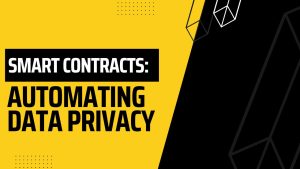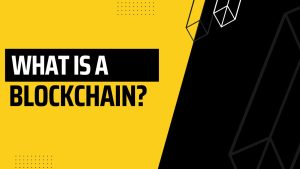How does the blockchain help to support data privacy?
This is what we will be taking a look at in this blog post, we’ll also take a look at all the mechanisms that different blockchain networks employ to keep data private and secure.
But first, we’ll start with the basics, what is a blockchain?
What is Blockchain?
Blockchain is a technology that allows people to store and exchange information securely over the internet.
And no, it’s not hosted in one place like a server giving specific access to data by only a select group of people, it is like a digital ledger or a record book that keeps track of transactions or data.
What makes blockchain special is that it uses advanced math and cryptography to ensure that the information stored in it is safe, transparent, and cannot be easily changed or tampered with.
It’s a special way of storing information that makes it really hard for anyone to mess with.
You see, in the old days, people used to keep their important information in big folders or on computer hard drives.
But sometimes, hackers would try to break into these folders or hack into the computers to steal the information.
And thus, large organizations saw the need for blockchain storage and the need a better way to protect our data.
Data privacy is all about keeping our personal information, like our names, addresses, and secrets, safe from prying eyes. It’s like having a secret hideout that only we know about. We want to make sure that no one else can see or use our information without our permission.
What is Data Privacy?
Data privacy is all about protecting our private information from prying eyes, such as our names, addresses, and secrets. It’s similar to having a safe house that only we are aware of. No one else should be able to access or use our information without our consent.
It involves the proper handling of personally identifiable information (PII), such as names, addresses, Social Security numbers, and credit card numbers,
The concept of data privacy, however, also applies to other valuable or secret information, such as financial information, intellectual property, and private health data.
The Problem with Traditional Data Storage
Traditional data storage methods were like houses with locks that could be easily picked by sneaky thieves. It was hard to keep our information safe from their prying eyes.
Plus, if something happened to the storage device, like a computer crashing or a folder getting lost, all the valuable information could be gone forever
We all know in the old days how we sometimes keep our important things in a special box or a secret hiding stash.
Well, that’s how people used to store their important information too. They would keep it in big folders or on computer hard drives. But there was a problem.
So, people started looking for a solution, a better and more secure way to store and protect our data in a reliable manner. This led to the implementation of various blockchains in data privacy and security.
How Does Blockchain Work?
Blockchain gives data privacy and security using three mechanisms.
- Blocks and Chains
- Decentralization
- Consensus Mechanisms

Think of a unique notepad where you keep all of your secrets and private data. It makes sense that you would wish to prevent anyone else from reading what you wrote. Well, blockchain can save the day in this situation!
In the blockchain, blocks make up your notebook much like pages do in a journal. Some of your secrets, such as your preferred ice cream flavor or your hidden location for treasure, are contained in each block. The nice thing is that these blocks are linked together to form a chain, which adds further security.
Every time you enter information into a block, it is securely locked up using unique codes and encryption. It’s like to locking your secrets in a magical box with an incredibly powerful lock.
When any information is entered or typed into the block, it instantly arranges itself to the rest of the data like a building block or Lego block to be found easier later.
The other way a blockchain operates using decentralization of data.
On that same notebook I used in the first instance, with a blockchain, everyone who is a part of the blockchain receives a copy of your unique notebook rather than keeping it in just one location.
Therefore, if someone tries to pry into your secrets, all of your pals will catch on and tell them to stop. This implies that no one person or business has control over the important details in that book.
When it comes to adding new secrets or information to the blocks, every participant in the blockchain has to agree that the information is true and valid. It’s like having a group discussion and making sure everyone says and verifies the information as true.
This consensus mechanism ensures that only accurate and trustworthy information is added to the blockchain. It’s like having a truth-checking system to keep everything reliable and secure.
So, with blockchain, your information is protected by blocks and chains, making it super hard for anyone to peek at them.
The decentralized nature of blockchain ensures that your secrets are safe from hackers and unauthorized participants. And the consensus mechanism makes sure that only the truth makes its way into the blockchain.
Smart Contracts: Automating Data Privacy
Smart contracts guarantee a tamper-proof and permanent record of the agreement once they are installed on a blockchain. Traditional contracts cannot provide this level of security because they can be changed or destroyed without leaving any trace.

Smart contracts bring a whole new level of data privacy and security to the blockchain. They make sure that our information is handled according to our preferences and stays confidential.
It’s like having a reliable assistant who takes care of our data privacy needs without us having to worry about it.
Smart contracts are like little computer programs that run on the blockchain. They help automate privacy and make sure our data stays safe and secure according to certain rules.
Smart contracts are like little computer programs that run on the blockchain. They help automate privacy and make sure our data stays safe and secure according to certain rules.
It’s like having a smart bodyguard there on the blockchain that keeps track of every piece of information and acts in a certain manner when something tries to go amiss.
Smart contracts guarantee a tamper-proof and permanent record of the agreement once they are installed on a blockchain. Traditional contracts cannot provide this level of security because they can be changed or destroyed without leaving any trace.
See also: Smart Contracts: Meaning, Uses and Benefits
And how does it operate?
To access the secret message, some guidelines and requirements are established by the smart contract.
It serves as a gatekeeper, preventing anyone who is not allowed from opening and reading the message. It is comparable to having a private password that only you and your friend know.
And this is just one example of how a smart contract can be applied. To see more, check out our other posts about smart contracts.
Benefits of Blockchain for Data Privacy
Now that we’ve seen how smart contracts operate and help with data privacy, in this section, we’ll take a look at the benefits of using blockchain for data privacy:
- Enhanced Security: Every blockchain uses advanced cryptographic techniques and decentralization to make sure our data is safe from hackers and unauthorized access.
- Trustworthy Transactions: When we share or exchange information on the blockchain, we can be sure that it’s accurate and reliable. A blockchain’s transparent nature allows us to verify and validate every transaction, promoting trust and reducing the chances of fraud or manipulation.
- Control Over Personal Information: Instead of relying on third parties to safeguard our information, we can manage it ourselves. We get to decide who can access our data and under what conditions.
- Reduced Intermediaries: In traditional systems, there are often middlemen or intermediaries involved in managing and securing our data. Blockchain removes the need for them, by making transactions faster and more efficient. It’s like having a direct line of communication without unnecessary stops.
- Improved Transparency: The transparent nature of a blockchain allows us to see and verify information easily. Every transaction is recorded in a public ledger, creating a clear trail of data.
- Cross-Organizational Collaboration: Blockchain enables secure collaboration and sharing of data between different organizations or entities. It eliminates the need for each party to maintain separate databases, reducing redundancy.
Use Cases of Blockchain in Data Privacy
- Healthcare Records: Blockchain supports data privacy by changing the way healthcare records are managed. By storing medical data on the blockchain, patients have control over who can access their records. It enables secure and seamless sharing of medical information among healthcare providers while maintaining patient privacy.
- Identity Verification: Blockchain offers a decentralized and secure solution for identity verification. Instead of relying on centralized databases that are vulnerable to breaches, blockchain can provide individuals with self-sovereign identities. Users can share specific identity attributes without revealing their complete personal information, ensuring privacy while verifying identities.
- Supply Chain Management: Blockchain supports data privacy in supply chain management by allowing for the tracking and verification of every step in the supply chain, and also ensuring authenticity and preventing unauthorized access or tampering. It ensures that sensitive information, such as intellectual property or trade secrets, remains protected.
- Financial Transactions: Blockchain technology is widely used in cryptocurrencies like Bitcoin to facilitate secure and private financial transactions. With blockchain, users can transfer funds directly to each other without the need for intermediaries, ensuring privacy and reducing the risk of fraud.
- IoT Data Security: The Internet of Things (IoT) generates a massive amount of data. Blockchain can ensure the security and privacy of this data by enabling secure communication and data exchange between IoT devices. It allows for encrypted and tamper-proof storage of IoT data, protecting sensitive information from unauthorized access.
- Voting Systems: Blockchain can revolutionize voting systems by providing secure and transparent elections. It ensures the privacy of voters while maintaining the integrity of the voting process. Each vote can be securely recorded on the blockchain, making it tamper-resistant and enhancing trust in the electoral process.
